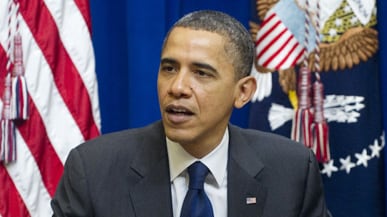President Obama has stated, in a telephone call with Angela Merkel on Saturday about Colonel Gaddafi, that "When a leader's only means of staying in power is to use mass violence against his own people, he has lost the legitimacy to rule and needs to do what is right for his country by leaving now." Could this be the long-awaited "Obama Doctrine," at least in outline? It certainly seems to have the high-sounding tome of a presidential pronouncement.
Every president strives to have a foreign policy Doctrine—note the capital D—that gets named after him. The Truman Doctrine prescribed the way to contain Communism, the Kennedy Doctrine the way to defy it, and the Reagan Doctrine the way to defeat it. More recently, the Bush Doctrine defined how, in the War on Terror, states had to decide whether they were for America or against her, and explained unequivocally what would happen to those caught on the wrong side of the divide. In this year of revolutions in the Middle East, President Obama might now be stumbling towards an Obama Doctrine, in a foreign policy so far made in a vacuum.

It may be completely absurd in historical terms, but at least its overarching theme about legitimacy sounds good. If it had been promulgated in 1861, of course, when Abraham Lincoln used mass violence against an insurrection of his own people for four years at the cost of 600,000 lives, Barack Obama might not have the vote today, but there's little advantage in pointing out such intellectual and historical inconsistencies. Otherwise we might also wind up wondering why the then Senator Obama opposed a war to overthrow a certain Iraqi dictator who used mass violence against his own people as his only means of staying in power?
For President Obama is a man who does not want to act when it's right to do so unless it also sounds right. If the sound bite fits, do it, especially if it includes impressive words from international jurisprudence like "legitimacy." The fact is, however, that were the pro-Gaddafi forces, which seem to include the all-important air force, actually—God forbid—to defeat the insurgents, and were Gaddafi to re-establish control in Libya, the United States and the West would quickly find that he had re-established his "legitimacy to rule" too. We would be sending back our oilmen after a decent interval, all talk of "legitimacy" conveniently forgotten. Legitimacy comes from different places in different countries at different periods of history, and in Libya since 1969 it has come from the barrel of a gun, which is where it very firmly remains today.
For President Obama is a man who does not want to act when it's right to do so unless it also sounds right.
That is not to say that President Obama should not stick to his newfound Doctrine, just so long as he extends it to countries beyond the Middle East. Were the Chinese to use mass violence against their own people as their only means of staying in power, as they did in Tiananmen Square in 1989, can we expect President Obama to call for them "to do what is right for their country by leaving now," or would it just apply to weak powers like Robert Mugabe's Zimbabwe or the military dictatorship in Burma?
Or is this latest pronouncement, as I suspect, merely a high-sounding form of words that sounds good for the present Libyan situation, but which will be swiftly forgotten the moment they no longer suit the Obama Administration's immediate requirements.
Historian Andrew Roberts' latest book, Masters and Commanders , was published in the UK in September. His previous books include Napoleon and Wellington, Hitler and Churchill, and A History of the English-Speaking Peoples Since 1900 . Roberts is a fellow of the Royal Society of Literature.





